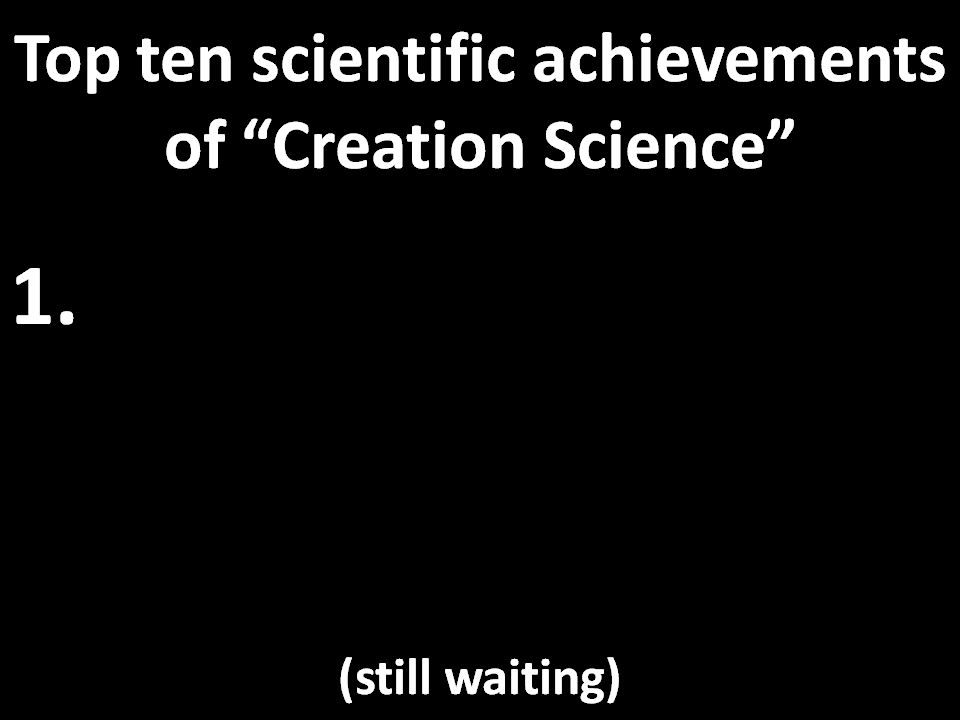I’ll state the obvious again:
@Johnz, there is no diplomatic way to say it. When you falsely pretend that nobody mentioned the benefits, you lose all credibility—because people can read and double-check what was posted. (Plus, we’ve had this discussion on other threads, where even more details about useful scientific benefits were posted.) You were much better off using the traditional evidence-denial tactic of saying, “Yes, those are benefits but they were achieved without any use of the Theory of Evolution.”
Your simplistic mantras like “All of the scientists who published the biology textbooks were FRAUDULENT when writing the definition of evolution” while claiming that you know better than the entire science academy sound just a wee bit…shall we say “over-reaching”? (I’m intentionally avoiding the most obvious descriptions of such.) Yet, you manufactured out of thin air the false claim that I had declared Andrew Snelling’s PhD “invalid” and that, therefore, you claimed that I was attacking his character. After you attacked the character of the entire science academy by calling them “fraudulent”, don’t you think most readers will notice the hypocrisy in your disproportionate complaints? (Of course, readers will also notice the dishonesty of the false attribution tactic of saying that I called Snelling’s PhD "invalid.)
If you want more specifics, why not investigate how various companies are using their understanding of evolutionary processes to produce energy-saving, light-producing plants? (Do you think people like me would have invested millions of dollars in these companies if it was all a lie?) Of course, several participants on these forums have explained to you that each year’s flu vaccines depend on an understanding of evolution—but your standard reply is to claim the scientists wrong because, despite your lack of training in the relevant fields of science, you know better. I call that hubris, the readers will make up their own minds about it. And some will definitely revisit the honesty issue. (You leave them little choice.)
So don’t complain that nobody has given you specifics—all while you continually dodge the questions posed to you. Most of all, if all of the scientists are wrong and your views are correct, Why aren’t oil exploration companies hiring “flood geologists” and Young Earth Creationist who have a better understanding of the history of the earth and how oil is formed?
Of course, to expect a scientific theory which explains changes in allele frequencies in populations over time to also explain, “How did the first biological life originate?” tells readers that you don’t understand the definition of lots of science terms, including a scientific theory. (Do you expect the Theory of Photosynthesis to explain not only the role of light in photosynthesis but also to explain how light is produced by the sun? I doubt that you are that consistent in your misunderstanding of what is scientific theory is all about.)
I must admit amazement, however, that you went ahead with the mind-numbing Scientists don’t want to include abiogenesis in the Theory of Evolution because they know they don’t have a good answer DESPITE my having lamented that silly but popular whopper immediately prior. That tells me that you feel obligated to stay “on script” no matter how embarrassing the argument in the immediate context of the discussion!
Meanwhile, I’m still interested in BenKirke’s question that you keep dodging: Does young earth creation theory provide any useful scientific benefit? Name last year’s most significant “creation science” discovery. Or the last decade’s greatest discovery. Or the last century.
Seeing how you consider “Does evolution theory provide any useful scientific benefit?” an important question (at least, important enough for you to post it and then include your own “No!” answer as the obvious purpose of your question), how do YOUR “theories” provide any useful scientific benefits?
Of course, if you agree that “creation science” and “young earth creation theory” and “ID theory” aren’t science at all, nobody need expect them to provide any useful scientific benefits—and readers have no reason to be surprised that no industries and products arise from them.
